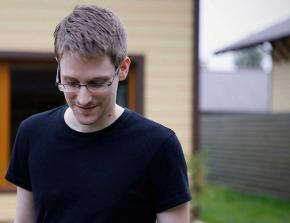Snowden on the silver screen
CITIZENFOUR humanizes the story of NSA analyst Edward Snowden and his quest to expose the secrets of a secretive spy agency, explains .
IT BEGINS with text on a black screen, the voice of filmmaker Laura Poitras reading a message from the anonymous source who will later be revealed to be NSA whistleblower Edward Snowden. "Only you can tell this story," the source insists. And while, in a literal sense, that may not be exactly true, it is hard to imagine a more compelling presentation of the story of Edward Snowden and the leak heard round the world than Laura Poitras's documentary CITIZENFOUR.
For those who have followed the news stories produced from Snowden's leaked documents or read Glenn Greenwald's book No Place to Hide, the documentary contains little in the way of new information about the inner workings of the NSA. (There are a few shockers, though, like the fact that Snowden was able to watch live-streaming footage from the U.S. fleet of surveillance drones from his NSA computer with a click.) But a recap of the leaks themselves is neither the film's purpose nor its greatest strength.
Instead, it functions as an intensely personal portrait of Snowden--and, to a lesser extent, Greenwald and Poitras herself, as they prepare to deliver a giant journalistic poke in the eye to the most powerful surveillance system the world has ever seen.

The film unfolds like a verité thriller, with the mysterious source's encrypted messages to Poitras giving an eerie urgency to what would otherwise be a fairly standard documentary first act, in which we learn about the NSA's vast data-storage capacity and witness some of its top officers blatantly lying to Congress.
We also learn why, out of all the journalists working in the English language, Snowden decided to trust Laura Poitras: She had herself been a victim of the surveillance system Snowden was seeking to expose.
After filming her Oscar-nominated documentary My Country, My Country in Iraq in 2006, Poitras found herself placed on a U.S. government watch list. During the next six years, she would be detained, questioned and searched more than 40 times entering or leaving the U.S., and sometimes by U.S. Customs officials at international airports. Sometimes her cell phone and computer were confiscated, and once an official at Newark Airport threatened to handcuff her for taking notes during an interrogation.
In order to protect her documentary sources and her own privacy, Poitras began encrypting her communications--the reason Snowden felt it was safe enough to contact her. In 2011, she also began working on a documentary about the U.S. surveillance state, filming with Julian Assange and previous NSA whistleblower Bill Binney. She was partway through making the film when she began receiving anonymous messages from Snowden.
His first instructions to her were on how to increase her already formidable electronic security to withstand powerful hacking attacks. "Assume your adversary is capable of a trillion guesses per second," he advised. He also requested that she reach out to Glenn Greenwald, whom Snowden had tried to contact but been unable to communicate with securely.
IN JUNE 2013, Poitras, Greenwald and Guardian reporter Ewen MacAskill traveled to Hong Kong to meet a source whose name, gender and age they still did not know. They spent eight days in Hong Kong interviewing Snowden in his anonymous-looking hotel room, with Poitras filming.
This simple tableau of four people in a hotel room fills most of the middle hour of the film, and it's absolutely riveting--nerve-jangling at times, blackly funny at others (as when Snowden starts teasing Greenwald about the length of his password), and surprisingly affecting at others, as when Snowden learns via encrypted chat that NSA employees have stopped by his Hawaii home to question his partner Lindsay Mills.
Throughout it all, Snowden--not yet 30 at the time--is articulate, smart, funny, self-deprecating but clearly passionate about his beliefs. The net effect is a profoundly humanizing portrait of someone who's mostly chosen to stay out of the spotlight.
It takes a sophisticated filmmaker to realize that there is nothing more interesting you can film than ordinary people making the most momentous decision of their lives, and then reacting to the consequences of that decision. This is the kind of high drama that fiction writers strive to evoke, and Poitras has it happening right in front of her--a real-life spy story that's infinitely more compelling than 99 percent of the dressed-up, fake-spy visions conjured up by Hollywood. Aided by atmospheric interstitial shots and a score that would be equally at home in a horror movie, Poitras has created a minimalist masterpiece that's both terrifying and profoundly inspiring.
Whether intentional or not, blending a spy thriller with what's essentially a character study is also a political statement. Beyond the actual content of the leaks, there's reason Snowden sent the NSA into such a temper tantrum: he reminded them that for all their technology, the surveillance state is still a machine that requires humans to run it. And sometimes those humans have consciences.
CITIZENFOUR also offers a lesson that anyone who's followed enough tales of real-life subversion and underground organizing should already know. While technology such as encrypted communications certainly played a role in allowing Snowden to do what he did, his main asset as a spy (or anti-spy) was guts.
He copied thousands of pages of documents under the nose of the NSA--even leaving a trail of his actions so his coworkers would not be suspected--then evaded the U.S. government on a transcontinental chase that only ended when the State Department revoked his passport, stranding him in Russia. His tools, by and large, were simple--carrying a shopping bag instead of a suitcase, swapping glasses for contact lenses.
While Snowden had some training in covert operations from his life in the intelligence world, his courage came entirely from his political convictions. That's a resource that anyone can possess. And--as the film's bravura final scene reveals--courage is contagious.


